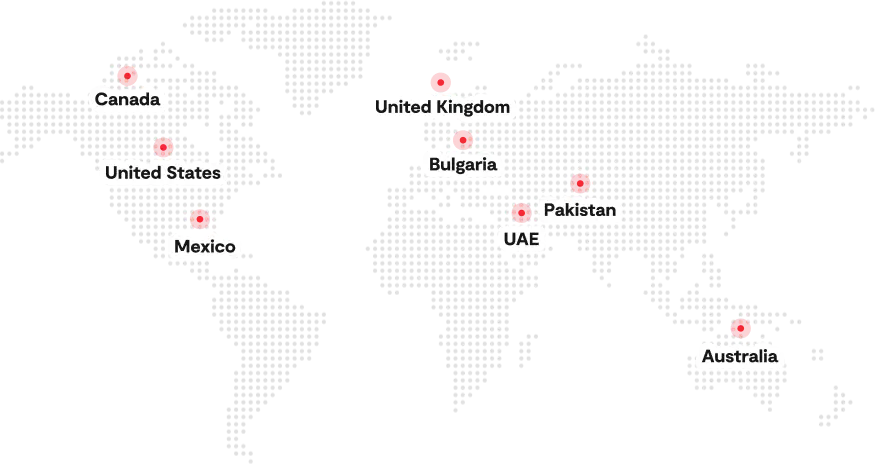With globalization breaking geographical barriers, small businesses and start-ups are now expanding beyond local markets and reaching a wider audience than ever before. To keep up with these opportunities and challenges, businesses must adopt tools that streamline operations, improve decision-making, and foster growth.
One such transformative tool is Enterprise Resource Planning (ERP) software. Historically associated with large enterprises, ERP systems have evolved into scalable solutions that cater to businesses of all sizes. Today, ERP software for small businesses is gaining traction as a game-changer, helping companies consolidate their data, automate processes, and improve productivity.
Whether running a small manufacturing unit, managing retail operations, or overseeing a service-based start-up, selecting the best ERP software for small businesses can empower your organization to thrive in a competitive marketplace. From cloud-based ERP software for small businesses that offers affordability and flexibility to even exploring options like free ERP software for small businesses, there’s a solution tailored to meet your needs.
Let’s explore the ERP selection process, understand its implementation, and uncover the benefits of integrating ERP into your operations. We’ll also explore how ERP software for small manufacturing businesses can revolutionize production workflows and introduce you to top ERP software solutions that can drive your business forward.
Ready to transform your business operations? Let’s dive in!
What is ERP Software for Small Business?
ERP software for small business is a comprehensive tool designed to integrate and manage core operations like accounting, inventory, HR, and customer relations within a single platform. By consolidating all these functions into one system, ERP software solutions provide small businesses with greater operational efficiency especially in areas like employee hiring and payroll and offer data-driven insights to streamline workflows and improve decision-making.
Cloud-based ERP software for small businesses is a popular choice because it is affordable and scalable. It eliminates the need for costly hardware while offering easy accessibility. Manufacturing businesses benefit from ERP software for small manufacturing businesses, which includes specialized features like production scheduling and inventory tracking. For companies with unique operational needs, investing in custom ERP solutions can offer tailored functionality that enhances overall business performance.
Start-ups and small businesses can explore options ranging from premium systems, considered the best ERP software for small businesses, to basic free ERP software for small business solutions. Regardless of the choice, ERP software testing services and solutions empower small enterprises to improve workflows, reduce errors, and foster growth effectively. As ERP adoption continues to grow across various sectors, even specialized fields such as the veterinary industry are leveraging modern digital platforms to enhance operational efficiency and streamline business processes.
Selecting the best ERP software for small businesses depends on various factors, such as the business’s nature, size, and specific requirements. However, the core value remains the same: empowering small businesses to operate more efficiently, adapt to changing market demands, and quickly scale their operations.
Why Consider ERP Software for Small Business? – 6 Reasons Why Small Businesses Need an ERP System
ERP software for small businesses has evolved from a tool for large corporations to a game-changer for small enterprises. Statistics show that 65% of small businesses use ERP to manage and scale their business operations. By integrating all business functions into one cohesive system, ERP solutions act as a central hub that enhances efficiency, streamlines operations, and boosts productivity.
With the advent of cloud-based ERP software for small businesses, even smaller companies can now access advanced tools previously reserved for larger organizations. These systems provide business intelligence, real-time data, and analytics, helping small businesses operate with greater agility and make more informed decisions.
Whether looking at popular ERP software solutions like SAP Business One, Microsoft Dynamics 365 Business Central, ERPnext, or Odoo ERP, selecting the best custom ERP software development for small business can significantly improve your operations and set the stage for future growth. Here’s why considering ERP is a smart move for your small business:
1. Enhanced Efficiency and Scalability
ERP solutions automate repetitive tasks and optimize workflows. As your business expands, the system scales with you, adding functionalities without a complete overhaul. For instance, a small online retailer can use cloud-based ERP software for small business to automate order processing and inventory management, allowing the system to handle higher sales volumes without the need for additional staff.
2. Data-Driven Decision Making
With centralized, real-time data, ERP systems enable small business owners to make quick, informed decisions. Business intelligence tools offer insights into performance, empowering owners to adjust strategies when necessary. For example, a boutique marketing agency can use ERP software solutions to track project profitability in real time, ensuring efficient resource allocation.
3. Improved Financial Management
ERP systems provide a clearer view of financial health, helping businesses manage cash flow, improve invoicing accuracy, and ensure timely payments. Many ERP systems include advanced accounting features and, in some cases, connect to an AI platform for finance workflows to help small businesses manage finances effectively. A small construction firm, for example, can track expenses across multiple projects, identify cost overruns early, and adjust budgets accordingly.
4. Enhanced Customer Engagement
Integrated CRM features within ERP systems allow small businesses to manage customer relationships more effectively. By using a simple cloud based CRM, businesses can create personalized experiences that drive loyalty by accessing detailed customer data. Businesses can create personalized experiences that drive loyalty by accessing detailed customer data. Private equity CRM software also offers specialized tools to help firms manage investor relations and portfolio companies more efficiently, enhancing overall engagement and oversight. For example, a local bakery might use ERP-integrated CRM to track customer preferences and send customized promotions, increasing repeat business.
5. Competitive Edge
ERP systems allow small businesses to compete with larger companies by streamlining operations and improving efficiency. Cloud-based ERP software for small business provides access to enterprise-grade tools at a fraction of the cost. For example, a small electronics distributor can optimize inventory levels, ensuring they match the quick delivery times of their larger competitors.
6. Sales Channel Consistency
An ERP system can be easily integrated with other existing systems a small business relies on, such as eCommerce platforms and marketplaces. In ERP eCommerce integrations, customer, order, delivery, and product hierarchy data flow from the eCommerce platform to the ERP system, while logistics, supplier, vendor, bill of materials, product pricing, and inventory data are transmitted in the opposite direction, from the ERP to the eCommerce platform. This synchronization keeps data up to date across systems, reduces errors, decreases manual data entry, and improves overall efficiency for small businesses. To further streamline operations, many small businesses use fulfillment software alongside ERP solutions. This combination automates order processing, manages shipping workflows, tracks inventory in real time, and ensures timely delivery — all of which enhance customer satisfaction and overall operational efficiency.
Top 5 Cloud-Based ERP Software for Small Business in 2024
Selecting the best ERP software for small business is crucial for optimizing operations and ensuring scalability. Cloud-based ERP systems have become increasingly popular due to their flexibility, cost-effectiveness, and ability to integrate various business functions seamlessly. In this guide, we will explore the top 5 cloud-based ERP software for small business in 2024, examining their pros, cons, features, and which type of business each is best suited for.
1. Oracle NetSuite:
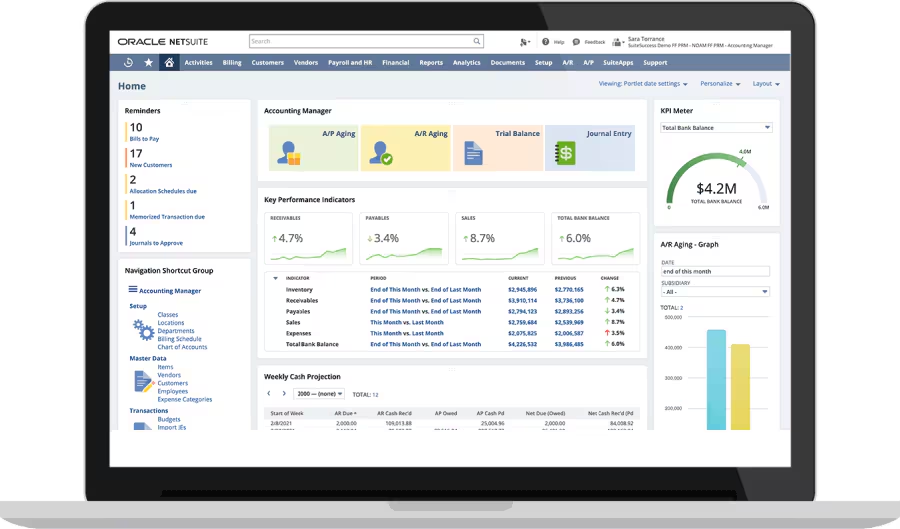
Oracle Netsuite provides cloud-based ERP software for small business. It helps companies get a 360° view of their business and identify which areas are performing well and need improvement. Customers pay subscription fees, but the underlying infrastructure and maintenance are not charged, making it a cost-effective solution.
With its comprehensive suite of tools, NetSuite in agriculture empowers farmers and agribusinesses to streamline their operations, from financial management to logistics and supply chain management. This holistic approach ensures that every aspect of the agricultural business is optimized, allowing stakeholders to make informed decisions that drive growth and efficiency.
Key Features
- Financial Management: Comprehensive tools for managing accounting, financial reporting, and invoicing.
- Order and Inventory Management: Streamlines sales order processing, procurement, and inventory tracking.
- CRM Integration: Integrated Customer Relationship Management (CRM) tools to manage sales and customer service.
- eCommerce Capabilities: Features for online storefronts, order fulfillment, and payment processing.
- Real-time Analytics: Provides business intelligence with real-time data and insights for decision-making.
- Scalability: Can grow with the business, supporting increasing users and expanding business operations.
Pros
- Comprehensive features: It offers various functionalities, including financial management, order processing, CRM, inventory management, and HR management.
- Scalable: This option is ideal for businesses looking to scale. As your company grows, Oracle NetSuite can accommodate increased complexity and more users.
- Real-time data: Provides real-time insights, helping businesses make informed decisions quickly.
Cons
- Cost: While a powerful solution, Oracle NetSuite can be expensive for small businesses, making it less suitable for companies on a tight budget.
- Complex implementation: Due to the vast number of features, the setup process can be time-consuming and require expert support.
Best for: Medium to large small businesses, especially those in industries like retail, distribution, and eCommerce. NetSuite’s comprehensive suite also benefits ERP software for small manufacturing businesses.
At Folio3 AgTech, we specialize in implementing industry-leading ERP solutions like NetSuite and Dynamics 365. As trusted partners of both platforms, we leverage our extensive expertise to help businesses streamline operations, improve efficiency, and achieve their goals.
While we don’t offer proprietary ERP software, our team excels in tailoring NetSuite and Dynamics 365 implementations to meet your business’s unique needs. From seamless integrations to custom configurations, Folio3 ensures you get the most out of your ERP investment, enabling you to focus on growth and innovation.
2. Acumatica:
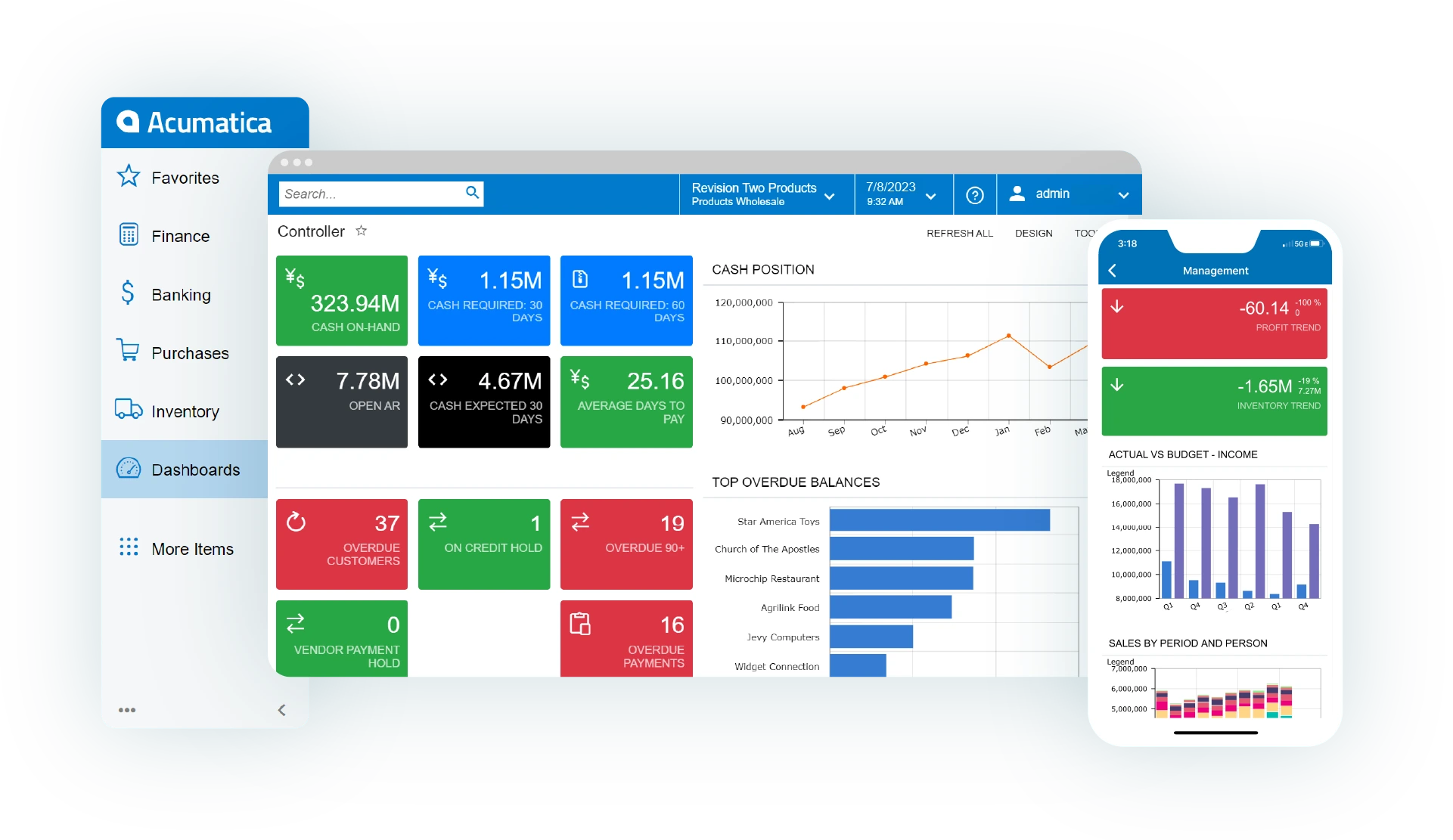
Acumatica is a flexible and powerful cloud-based ERP software for small business, known for its robust financial management features and scalability. It is well-suited for companies that require robust reporting and analytics. It lets you quickly integrate your current tools and applications and works well on mobile applications. It has several customization features through which businesses can create custom reports according to their needs and requirements.
Key Features
- Financial Management: Includes general ledger, accounts payable/receivable, and financial reporting tools.
- Manufacturing and Distribution: Tools for managing production scheduling, inventory, and order processing.
- Cloud Integration: Fully cloud-based, ensuring access from anywhere with an internet connection.
- Customizable Dashboards: Real-time business intelligence dashboards for monitoring performance and KPIs.
- Mobile Access: Allows users to access ERP features on mobile devices for greater flexibility.
- Project Accounting: Helps manage project budgets, expenses, and billing, suitable for service-based businesses.
Pros
- User-friendly interface: Acumatica’s easy-to-use interface makes it accessible for businesses without deep technical expertise.
- Flexible pricing: Acumatica offers flexible pricing based on resource usage, making it cost-effective for businesses of different sizes.
- Customizable: Allows extensive customization to suit the unique needs of different industries.
Cons
- Requires training: While the interface is user-friendly, the depth of features may require some initial staff training.
- Limited mobile functionality: Acumatica’s mobile app is less comprehensive than its desktop version, which may be limiting for some users.
Best for: Small retail, manufacturing, and distribution businesses. Acumatica’s flexibility makes it ideal for companies that need a tailored approach and robust reporting.
3. Microsoft Dynamics 365
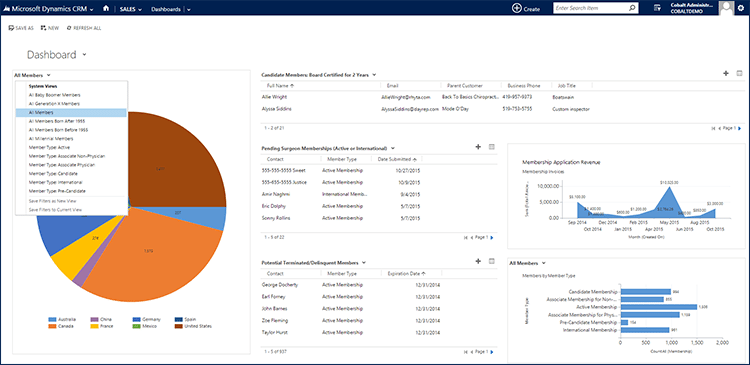
Microsoft Dynamics 365 is a widely used ERP software for small businesses. It is known for integrating with Microsoft products like Office 365 and Azure and offers a range of functionalities across finance, sales, and customer service. The solution seamlessly integrates with other Microsoft products, such as Office 365, Power BI, and Azure, providing unified business productivity and analytic platforms.
Key Features
- Finance Management: Includes general ledger, accounts payable/receivable, and financial forecasting tools.
- Supply Chain Management: Tools for managing inventory, procurement, and logistics across the supply chain.
- Sales and Marketing: Built-in CRM tools for managing leads, sales opportunities, and marketing campaigns.
- Customer Service: Includes customer service tools for managing cases, incidents, and support tickets.
- Artificial Intelligence (AI): Built-in AI tools for predictive analytics and automating business processes.
- Integration with Microsoft Products: Seamlessly integrates with Office 365, Microsoft Power BI, and other Microsoft applications.
Pros
- Seamless Microsoft integration: Integrates effortlessly with other Microsoft tools, making it perfect for businesses already using Microsoft products.
- Comprehensive modules: This company offers modules for sales, finance, HR, marketing, and supply chain, providing an all-in-one solution.
- Cloud-based accessibility: As a cloud-based solution, it offers accessibility from any device with an internet connection.
Cons
- Higher cost: Microsoft Dynamics 365 can be more expensive than other ERP solutions, which might make it less suitable for tiny businesses or startups.
- Complex for small businesses: It offers a broad range of features, which might be overwhelming for small businesses that only need basic functionalities.
Best for: Small businesses looking for seamless integration with Microsoft products, particularly those in retail, manufacturing, and service-based industries.
Folio3 AgTech is a trusted implementation partner, and we understand the unique challenges small businesses face. We specialize in delivering customized ERP solutions that integrate seamlessly with your existing systems. While we don’t develop our own ERP software, our team excels at configuring and deploying Dynamics 365 and NetSuite to meet your operational needs.
4. SAP Business One

SAP Business One is designed specifically for small—to medium-sized businesses (SMBs). It offers affordable ERP software with powerful features that focus on improving business processes and decision-making. It helps SMBs automate critical operations such as finance, sales, inventory, and procurement. AI-driven analytics provide real-time insights that help businesses measure their performance and make timely decisions.
Key Features
- Financial Management: Handles accounting, financial reporting, and cash flow management.
- Inventory and Production Management: Tools for managing stock, tracking inventory, and planning production schedules.
- Customer Relationship Management (CRM): Integrated CRM features for managing customer interactions and sales processes.
- Analytics and Reporting: Built-in reporting tools for real-time data analysis and decision-making.
- Project Management: Project management tools, including cost tracking, resource allocation, and project reporting, play a vital role in preparing professionals for a PMP Course. Leveraging Smartsheet integration enhances these processes further by streamlining collaboration and automating workflows, helping learners build stronger practical skills.
- Industry-Specific Solutions: Tailored features for industries like manufacturing, wholesale distribution, and retail.
Pros
- Industry-specific features: Offers tailored functionalities for industries like manufacturing, retail, and wholesale, making it an excellent choice for companies in those fields.
- Scalability: SAP Business One can grow with your business, handling increased demand and complexity.
- Affordable pricing for small businesses: Business One is more affordable than other SAP offerings.
Cons
- Steep learning curve: Users may need time to fully understand and navigate the system, especially if they’re new to ERP.
- Limited flexibility: Customizations can be more complex and require additional resources or consultants.
Best for: Small manufacturing businesses, retailers, and wholesalers that require a robust, scalable solution with industry-specific features.
5. Odoo
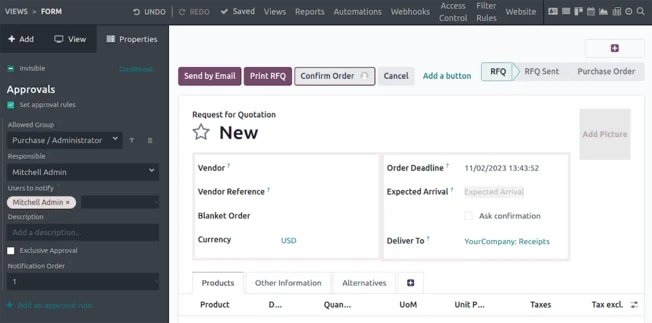
Odoo offers a modular approach to ERP, where businesses can pick and choose the features they need. It is one of the most versatile and affordable cloud-based ERP software for small businesses, especially startups and smaller enterprises. It allows businesses to select and integrate the necessary modules to meet their requirements.
Key Features
- Modular System: Businesses can select and add modules like CRM, sales, inventory, accounting, and HR.
- Inventory and Warehouse Management: Tools for managing stock levels, order processing, and warehouse logistics.
- Accounting and Financial Management: Includes tools for managing invoicing, financial reporting, and bank reconciliation.
- CRM and Sales Management: Built-in CRM for managing customer relationships and tracking sales activities.
- eCommerce Integration: Features for managing online stores, including product listings, orders, and payments.
- Open-Source Option: Odoo offers a free, open-source version that businesses with technical expertise can customize.
Pros
- Modular and flexible: Odoo’s modular nature allows businesses to choose specific features that suit their needs, such as sales, finance, inventory, and CRM.
- Affordable: Odoo is one of the more affordable ERP solutions available, with a free version for small businesses.
- Open-source option: Odoo’s open-source version provides significant cost savings and customization possibilities for tech-savvy businesses.
Cons
- Requires customization: While the system is flexible, it may require some customization to fully align with business needs, especially for more complex businesses.
- Support challenges: Some users report challenges in getting timely support, particularly with the community version.
Best for: Small businesses, particularly startups, and those looking for ERP software for small business or a highly customizable, budget-friendly solution. Ideal for businesses that need an affordable solution with core functionalities like CRM, sales, and inventory management.
Factors to Consider When Selecting an ERP System for Small Business
When choosing ERP software for small business, it’s crucial to evaluate several key factors that will impact its effectiveness and suitability for your company’s needs:
Cost-effectiveness
ERP systems can have significant upfront and ongoing costs. It is important to choose an ERP software solution that fits your budget while offering the features needed to improve efficiency. Consider the initial investment and any long-term costs such as maintenance, support, and upgrades.
Scalability
As your business grows, your ERP should grow with it. Select cloud-based ERP software for small businesses that can scale quickly without requiring a complete system overhaul. This ensures the system will accommodate increasing users, transactions, and business complexity over time.
User-friendliness
The ERP system should be intuitive and accessible for all employees, reducing the learning curve and minimizing training time. The best ERP software for small businesses should provide a clean interface with easy navigation to increase productivity across all departments.
Customizability
Every business is unique, so it’s essential to have a system that can be tailored to your specific processes and industry needs. Ensure the ERP software offers customization options to fit your workflow without unnecessary complexity.
Integration with existing systems
The ERP should easily integrate with your current business tools (such as accounting software or customer relationship management systems). Seamless integration helps avoid data silos and enhances the overall efficiency of your operations. In addition to ERP integration, businesses can benefit from leveraging effective internal tools that enhance productivity and streamline operations.
Vendor Reputation and Support
A reliable vendor with strong customer support is vital for smooth ERP implementation. Research the vendor’s track record, reviews, and responsiveness to ensure you select a trustworthy provider offering ongoing support and updates as needed.
Potential Challenges of ERP Software for Small Business and How to Overcome Them?
Implementing ERP software for small business can bring substantial benefits, but it also comes with certain challenges. Recognizing and addressing these challenges upfront can help ensure a smoother transition and maximize the ERP system’s effectiveness.
1. High Initial Costs
- Challenge: The cost of ERP systems, especially comprehensive solutions, can concern small businesses with limited budgets. This includes licensing fees, setup costs, and ongoing maintenance.
- Solution: Look for cost-effective ERP software solutions that offer flexible pricing models, such as subscription-based cloud options. Free ERP software for small businesses might also be a viable option for starting companies. Additionally, scalability should be considered to avoid expensive overhauls in the future.
2. Resistance to Change
- Challenge: Employees may only accept adopting a new system if they are accustomed to manual processes or legacy software.
- Solution: To ease the transition, involve employees early in the selection and customization process. Offer comprehensive training and support to ensure they understand the new system’s benefits. Regular communication about the ERP’s positive impact can also help overcome resistance.
3. Data Migration Issues
- Challenge: Migrating data from legacy systems to the new ERP can be complex and time-consuming. Data loss, duplication, or corruption can occur if not handled properly.
- Solution: Plan and execute a detailed data migration strategy. Use tools to clean and organize existing data before migration, and consider working with the ERP vendor for a smooth transfer. Conduct testing after the migration to ensure the data is accurate and functional.
4. Integration with Existing Systems
- Challenge: ERP systems may need help integrating with existing software like accounting tools, CRM, or inventory management systems, leading to disruptions in operations.
- Solution: Select an ERP software that seamlessly integrates your current systems. Many cloud-based ERP systems for small businesses come with built-in integrations or easy-to-use APIs to connect with other tools. Work closely with the vendor to ensure compatibility.
5. Complexity and Over-customization
- Challenge: ERP systems can be complex, especially if overly customized to fit specific business needs, leading to inefficiencies and increased costs.
- Solution: Focus on adopting a cloud-based ERP software for small business that can be easily scaled and customized without overcomplicating processes. Keep customizations to a minimum and prioritize essential features that directly benefit business operations.
6. Ongoing Support and Maintenance
- Challenge: Maintaining and updating the ERP system over time can require significant resources, especially as your business grows.
- Solution: Choose an ERP vendor with strong customer support and a track record of timely updates and maintenance. Opt for cloud-based ERP solutions with automatic updates, reducing the burden of manual upgrades.
How to Implement an ERP Software for Small Business?
Implementing ERP software for small business involves several vital steps to ensure a smooth transition and successful integration:
- Assess Business Needs: Begin by identifying your business’s specific needs. Understand the areas where automation, integration, and improved efficiency are most needed. This will guide you in selecting the best ERP software for small businesses that aligns with your goals.
- Choose the Right ERP Software: Based on your needs, select the cloud-based ERP software for small business that fits your budget, scalability requirements, and functional needs. Consider inventory management, financial tracking, and customer relationship management.
- Plan for Customization: Customize the ERP system to align with your business processes. Many ERP solutions offer flexibility to tailor workflows, dashboards, and reports to your company’s unique requirements.
- Data Migration: Safely migrate your existing data into the new ERP system. This may involve cleaning and organizing data from various sources to ensure accuracy and consistency in the new system.
- Employee Training: Ensure your team receives adequate training on the new ERP system. This step is critical to ensuring user adoption and minimizing resistance to change.
- Test the System: Conduct thorough testing before fully implementing the ERP to identify potential issues. This helps ensure that all integrations and functionalities are working as expected.
- Go Live and Provide Ongoing Support: Once the system is tested, it’s time to go live. Monitor the system closely during the initial phase and offer support to users. Regular updates and ongoing technical support from the vendor will help ensure long-term success.
How can Folio3 AgTech help Implement ERP software for small businesses?
Implementing an ERP system for small businesses can be daunting, especially considering the complexities of integrating new technology into your existing processes. For Small and Medium-Sized Businesses (SMBs) in industries like agriculture, the transition can be even more challenging due to unique operational requirements.
This is where Folio3 AgTech can make all the difference. With more than 20 years of experience in providing tailored, innovative ERP solutions, Folio3 is well-equipped to guide businesses through a smooth and successful ERP implementation journey.
1. Tailored ERP Solutions for SMBs
Folio3 AgTech understands that no two businesses are the same. They offer custom ERP solutions for agriculture, ensuring each software implementation aligns with SMBs’ unique operational needs.
2. Seamless Integration with Agricultural Operations
For businesses in the agriculture sector, managing everything from farm data to inventory and supply chains is critical. Folio3 AgTech specializes in integrating agricultural ERP systems with management software, helping businesses handle data from multiple departments, including farm management, inventory control, procurement management, and sales. With a seamless cloud-based ERP software for small business, the transition becomes less disruptive, reducing the risk of data silos and inefficiencies.
3. Expertise in Cloud ERP for Cost-Effective Transition
As SMBs look to reduce costs, cloud-based ERP software for small business provides an ideal solution. Folio3 AgTech offers cloud ERP solutions that require minimal upfront investment without the need for expensive hardware. This makes the system more affordable for SMBs and easier to scale as your business grows.
4. Data Migration and Integration Support
Migrating data from legacy systems to a new ERP can be one of the most challenging parts of the transition. Folio3 AgTech provides comprehensive data migration support, ensuring that your existing business data—inventory, financials, or customer data—is accurately and securely transferred to the new ERP system.
5. Ongoing Support and Optimization
Folio3 AgTech doesn’t just help with the initial ERP implementation—it also offers ongoing support and optimization. Folio3 continues fine-tuning your ERP system as your business evolves to ensure it remains aligned with your operational needs.
6. Enhancing Profitability through ERP
The ultimate goal of any ERP system is to improve efficiency, reduce operational costs, and increase profitability. With ERP software for small business focusing on optimizing resources and workflows, Folio3 AgTech helps firms in the agriculture sector with ERP solution achieve better profitability.
Conclusion
Implementing an ERP system for small business is time-consuming. All stakeholders must assess whether they need such a system or if their business can work efficiently without it. That said, businesses of all sizes can significantly benefit from increased efficiency and productivity with the right ERP system and implementation approach.
Folio3 AgTech’s expertise in the agriculture industry can significantly help agriculture SMBs find the right tech solution and successfully implement it for their business. With the right ERP system and implementation plan, small businesses can streamline their processes, improve decision-making, and stay competitive in the ever-evolving market.
FAQs
Can I Create My Own ERP?
While creating your own ERP system is possible, it can be resource-intensive and complex, requiring substantial technical expertise. Most small businesses find it more efficient and cost-effective to choose an existing ERP solution, such as cloud-based ERP software for small business, which can be customized to meet specific needs without the high costs and time investment of building a system from scratch.
Can ERP be Used for Small Business?
Yes, ERP system for small business can be used. Implementing an ERP system for small business can greatly benefit small businesses by streamlining processes, increasing efficiency and productivity, and improving decision-making.
How Much Does ERP Cost for a Small Business?
The cost of an ERP system for small business can vary depending on the features and services included. Some providers offer affordable monthly subscription plans, while others charge based on the number of users or modules the business requires. The average cost of ERP can fall between $150,000 and $750,000 for SMBs.
How Do I Choose the Best ERP for My Small Business?
The best ERP system for small business will depend on your specific needs and requirements. It is important to research and compare different options, consider the features and services included, and consult industry experts to find an ERP system that best fits your business.





